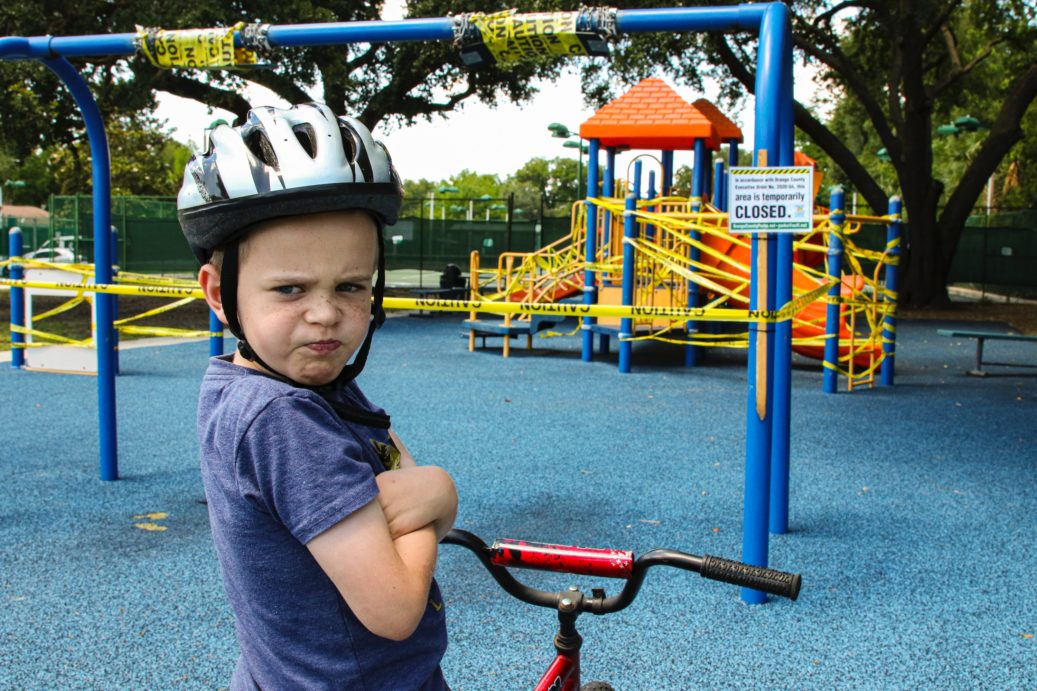Disciplining misbehavior often brings out the worst in us. Without considering what God might be up to with us and our child, we react quickly, yell, and do the thing the Bible tells us not to do: we exasperate our kids. I was reminded of this numerous times, most notably when my son responded to my quick, angry reaction by blurting, “Way to go Ogre!”
The question isn’t whether this will happen. It will. We’re human after all and the “sin that so easily entangles” truly does, well, entangle. The question is: Are we paying attention? Can we admit that the “fruit of the Spirit” in us often gets buried by selfish motives and poor self-control? Are we willing to confess our sin and grow?
Whether or how to engage is an important question, particularly when you feel the signs that you’re about to “burst all over.” Here is a process that can help you when you’re at the boiling point to be more thoughtful, graceful, and wise as you seek to help your kids grow. There are six practical ways to “get perspective” as you calm your heart for discipline that connects with your child’s heart.
1. Stop and Pray
I wish I could measure the difference between me as a dad when I stopped, took a breath, and prayed. I guarantee you I was much more the dad I wanted to be. My prayers were simple.
- “God you’re here. Thanks!”
- “God, give me wisdom and compassion.”
- “Lord, help me forgive and let go of my anger.”
- “Father, give me Your heart for my child.”
Nearly every dad I’ve helped learn this idea tells me, “I’m a much better dad when I stop and pray.” So I invite you to try it and see what you learn.
Note: If your child is posing immediate danger to himself and/or others, do what you need to do to offer protection. The less angrily you are able to do this the more constructive it will be in the long run.
2. Name your feelings
OK dads. You’re getting better about this over time, but there’s still more work we all can do to understand how our feelings affect our behavior. This understanding begins by naming those feelings. Do you know what’s going on in you when your child misbehaves? What are you actually feeling? Stressed, anxious, discouraged, hurt…? Are those feelings about your kids or are they about something else?
All too often parents’ intense feelings are not named or understood. The focus and emotions just stay on the child’s behavior. Other times, if feelings are identified, they are blamed on the child. Does this sound familiar? “YOU make me so mad!”
But the truth is, your feelings are your responsibility.
It helps to realize that your feelings are not your identity (“I am mad!”). Feelings are things you experience – (“I’m feeling really angry right now.”) So try saying this to yourself: “I am a child of God with some big angry feelings.”
This provides a great example for your kids: “I’m feeling really stressed and overwhelmed! And I want to settle down before we talk about this.”
3. Recite (aloud or internally) a scripture or a memorized phrase
I was not very good at this as a young dad. But I knew when I felt out of control. And I knew I didn’t want to feel that way. So I memorized Philippians 4:6,7 and made it my own: “Instead of being anxious, pray. Be grateful, even for the challenge. And tell God what you hope for. And whether you get it or not, the peace of God that transcends understanding will guard your heart and mind in Christ Jesus.”
Once I memorized this, when I was feeling out of control (and sometimes even behaved out of control) I’d go for a walk and say the verse out loud. That calmed me. I could go back to my family and do better.
One parent we coached would say, “God is here. God’s grace is for me!” Another simply said, “Ah, I love this kid!” Another dad’s “calming phrase” as he looked at his super intense daughter was, “God made you.”
4. Walk in your child’s shoes
God’s response to us when we “misbehave” is always guided by his compassion and insight into what we need.
For we do not have a high priest who is unable to empathize with our weaknesses, but we have one who has been tempted in every way, just as we are—yet he did not sin. Hebrews 4:15
Similar to Jesus, helping your child involves empathizing with your child. A helpful question to ask yourself at the moment might be, “What’s it like to be my child right now?”
More detailed questions may include:
- Have I ever felt similar emotions?
- What’s important to my child?
- What might my child need right now?
When you take a moment to see things from your child’s perspective, this gives you the compassion you need to respond wisely. This compassion will help as you guide your child through the challenge.
5. Look for the opportunity
We want our kids to know we love them unconditionally right? But when given the opportunity to show “love no matter what” we often miss it in the name of corrective discipline. But think about it. When do kids feel least loved? When they misbehave, right? So why not use the opportunity of their misbehavior to let them know without question, “You are loved!”
This doesn’t mean you ignore the behavior. It just means you make sure to let them know you love them right here and right now.
Once love is accessed (in your heart) and expressed (to your child), you can go into solving mode. Maybe like this: “Wow, you’re having a hard time with this. Kiddo, I love you! How do you want to get back on track here?”
The simple prayer, “Lord, what’s the opportunity here?” has become a powerful first response for many parents. It empowers wiser parenting and greatly decreases the times we “burst all over” our kids.
Now what?
At this point in the conversation, many parents will ask, “OK I get it. Calm down. Don’t lay my heavy feelings on my child. Empathize. Memorize a verse. And be creative. But what about consequences? What consequences should my child get for doing these things?
Friends, it’s my firm conviction that as you learn to follow the process described above, you will be attentive to God’s leading. You will be creative in how to help your child learn from real-life experiences. You’ll learn to guide your child to better understand that experience without imposing consequences. And when consequences are needed, you’ll learn to put things in place that help your child learn about taking responsibility to make right what they’ve made wrong.
May you experience the love of God in deeper ways as you learn to stop, calm yourself, and leave room for God’s mercy and grace to wash over you and your children in the tough moments of everyday life
When discipline aims at quick fixes to the behavior, it tends to be short-sighted, random, punitive, and unpredictable. Are you longing to find a different way to parent? One that is both biblical and research-based? Our Discipline That Connects With Your Child’s Heart online course is only offered twice a year. Registration is open! Join us. Your kids will thank you.
About


